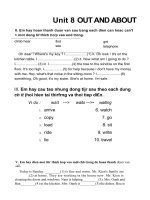Unit 8 Out and about
Bạn đang xem bản rút gọn của tài liệu. Xem và tải ngay bản đầy đủ của tài liệu tại đây (169.31 KB, 20 trang )
<span class='text_page_counter'>(1)</span><div class='page_container' data-page=1>
<i>Date of teaching: 14/11-18/11/2016</i>
<i>Class: 6A1, 6A2 </i>
<i>Week: 15</i>
<b>Period: 40</b>
<b>Unit 8: OUT AND ABOUT</b>
Lesson 1 A1-3: What are you doing? (p.p.82+83)
<b>I. OBJECTIVES:</b>
<b>1. Knowledge:</b>
<i><b>a. General knowledge: </b></i>
By the end of the lesson, Sts will be able to describe on-going activities then ask and
answer about those activities.
<b>b. Language contents:</b>
<b>- Vocabulary: ride (a bike), wait for, drive, some verbs-ing</b>
<i>- Structure: The present progressive, What + to be + S + V_ing?</i>
<b>2. Skills: Reading – Listening – Writing – Speaking</b>
<b>3. Attitude: Sts will try to play sports to be healthier.</b>
<b>II. PREPARATION:</b>
<b>1. Teacher:</b>
- Prepare the lesson carefully: (teaching aids, make lesson plan by power point, book, laptop,
sound).
<b>2. Students: </b>
- Prepare the new lesson at home: (write new words; read text; answer questions).
<b>- Paying attention to the lesson seriously, listen to the teachers.</b>
<b>III.</b> <b>STEP FOR TEACHING: </b>
<b>1. Check the previous lesson: (5’) </b>
- T asks Sts to write some words.
<b>2. The new lesson: (40’)</b>
<b>Stage</b> <b>Steps/Activities</b> <b><sub>Arrangement</sub>Work</b>
<b>Warm up</b>
(5’)
- T asks Sts to talk about Hoang’s activities.
- Sts look at the table and talk about Hoang’s activities
Action <b>TIME</b>
Get up 5.30
</div>
<span class='text_page_counter'>(2)</span><div class='page_container' data-page=2>
Go to school 6.30
Classes start 7.30
Classes end 11.30
Have lunch 12.00
<b>Ex: Hoang gets up at 5.30. He ……..</b>
-T asks Sts some more questions.
<i>What time do you get up/ go to school/ have lunch?</i>
- T leads to the new lesson.
Whole class
Whole class
<b>Presentation</b>
(10’)
- T elicits the vocabulary, using pictures, explanation and
then asks Sts to guess the meanings of words.
<i>ride (a bike): đạp (xe đạp)</i>
<i>wait for: đợi</i>
<i>drive: lái xe</i>
- Sts practice reading the vocabulary.
- T calls some Sts to read.
<b>Checking vocabulary: ROR</b>
- T hangs the pictures on the board, asks Sts to look at and
then put them in the right order.
- Sts listen to the tape and check (twice)
- T introduce the present progressive tense.
<i>I am + V-ing</i>
<i>She/ he + is + V-ing</i>
<i>They / we / you are + V-ing</i>
Ex: I am riding my bike
He is playing video games
We are waiting for a train
Whole class
Individually
Whole class
Whole class
<b>Practice</b>
(10’)
<b>- T plays the tape</b>
- Sts listen and repeat (twice)
- Sts practice reading
- T calls some Sts to read
- T asks Sts to work in pairs, do exercise A2
Whole class
</div>
<span class='text_page_counter'>(3)</span><div class='page_container' data-page=3>
<i>a. What is he doing ?</i>
→ He is playing video games.
<i>b. What is she doing ?</i>
→ She is riding her bike.
<i>c. What is he doing ?</i>
→ He is driving his car.
<i>d. What are they doing ?</i>
→ They are walking to school.
- Sts work in pairs
- T checks and corrects
- T asks Sts to look at the pictures on p.83, answer the
questions in pairs
<b>A3</b>
<i>a. I am doing my homework.</i>
<i>b. She is riding her bike.</i>
<i>c. He is driving his car .</i>
<i>d. They are waiting for a train.</i>
- Sts work in pairs
- T asks Sts to go to the board and write the answers.
- T checks and corrects
Whole class
Pair work
Pair work
Whole class
<b>Production</b>
(10’)
- T asks Sts to look at some more pictures, asks Sts to
work in pairs, using the present progresssive tense.
- Sts practice
- T checks and corrects
<b>Remember</b>
- The present progressive tense
Ex: What is he doing ?
He is listening to music.
Pair work
Whole class
<b>Consolidation</b>
(3’)
<b>Homework</b>
<b>- T asks Ss to make examples with Present progressive</b>
tennse.
<b>- Learn the vocabulary and structure by heart </b>
</div>
<span class='text_page_counter'>(4)</span><div class='page_container' data-page=4>
(2’) <sub>- Prepare for the next lesson: A4,5,6 </sub>
<b>DRAWING EXPERIENCE</b>
<b>_________________________________________________________</b>
<b>_________________________________________________________</b>
<b>_________________________________________________________</b>
<i>Date of teaching: 21/11-25/11/2016</i>
<i>Class: 6A1, 6A2 </i>
<i>Week: 15</i>
<b>Period: 41</b>
<b>Unit 8: OUT AND ABOUT</b>
Lesson 2 A4-6: What are you doing? (p.p.84+85)
<b>I. OBJECTIVES:</b>
<b>1. Knowledge:</b>
<i><b>a. General knowledge: </b></i>
By the end of the lesson , Sts will be able to listen and understand some activities then
read the text about Mr. Ha, Miss Hoa, Mrs. Vui, review the present progressive tense.
<b>b. Language contents:</b>
<b>- Vocabulary: businessman</b>
<i>- Structure: The present progressive: Who…doing?/ Where…going?/ How…travelling?</i>
<b>2. Skills: Reading – Listening – Writing – Speaking</b>
<b>3. Attitude: Sts will try to play sports to be healthier.</b>
<b>II. PREPARATION:</b>
<b>1. Teacher:</b>
- Prepare the lesson carefully: (teaching aids, make lesson plan by power point, book, laptop,
sound).
<b>2. Students: </b>
- Prepare the new lesson at home: (write new words; read text; answer questions).
<b>- Paying attention to the lesson seriously, listen to the teachers.</b>
</div>
<span class='text_page_counter'>(5)</span><div class='page_container' data-page=5>
<b>2. The new lesson: (40’)</b>
<b>Stage</b> <b>Steps/Activities</b> <b><sub>Arrangement</sub>Work</b>
<b>Warm up</b>
(5’)
- T hangs the pictures on p.84 on the board.
- T asks Sts to look at and describe the activities in each
picture.
- T guides Sts to do exercise 4
- T asks Sts to listen to the tape twice and do exercise 4
- Sts listen once more and give the answers.
<i><b>A4: Pictures</b></i>
a. riding his bike to school.
b. driving his car
c. walking
d. going around the city by motorbike.
e. waiting for a bus
f. waiting for a train.
* Key:
1. b 2. f 3. d 4. a 5. c 6. e
- T leads to the new lesson.
Whole class
Whole class
Whole class
<b>Presentation</b>
(10’)
- From warm up, teacher reminds the present progressive
tense
<b>- Sts listen and take note</b>
* Good students: Give examples
<b>The present progressive tense</b>
<i>I am + V-ing</i>
<i>She/ he + is + V-ing</i>
<i>They / we / you are + V-ing</i>
Ex: I am riding my bike
He is playing video games
We are waiting for a train
Whole class
Individually
Whole class
<b>Practice</b>
(10’)
- T hangs the picture 6a, b, c on p.85 on the board and asks
</div>
<span class='text_page_counter'>(6)</span><div class='page_container' data-page=6>
<i>T: Who is that? </i>
Sts: That is Lan.
<i>T: What does she do? </i>
Sts: She is a student.
<i>T: Where is she going? </i>
Sts: She is going to school.
<i>T: How is she traveling?</i>
Sts: She is traveling by bike.
- Sts answer
- T asks Sts to look at the pictures a, b, c on p.85 and do
the same.
- Sts work in pairs
- T calls some pairs to perform in front of the class.
<i><b>A6: pictures on p.85</b></i>
<i><b>a. </b></i>
S1: Who is that?
S2: That is Mr Ha.
S1:What does he do?
S2 : He is a businessman.
S1: Where is he going?
S2 : He is going to Hanoi.
S1: How is he traveling?
S2 : He is traveling by plane
Pair work
Whole class
Whole class
<b>Production</b>
(10’)
- T asks Sts to look at some more pictures, asks Sts to
work in pairs, using the present progresssive tense.
- T asks Sts to practice speaking free.
- Sts work in pairs
<b>Remember</b>
- The present progressive tense
Ex: What is he doing ?
He is listening to music.
Pair work
</div>
<span class='text_page_counter'>(7)</span><div class='page_container' data-page=7>
(3’)
<b>Homework</b>
(2’)
progressive to ask and answer
<b>- Learn the vocabulary and structure by heart </b>
- Prepare for the next lesson: B1-4
Individually
<b>DRAWING EXPERIENCE</b>
<b>_________________________________________________________</b>
<b>_________________________________________________________</b>
<b>_________________________________________________________</b>
<i>Date of teaching: 21-25/11/2016</i>
<i>Class: 6A1, 6A2 </i>
<i>Week: 16</i>
<b>Period: 42 + 43</b>
<b>Unit 8: OUT AND ABOUT</b>
Lesson 3+4 B1-4: A truck driver (p.p.86+87+88)
<b>I. OBJECTIVES:</b>
<b>1. Knowledge:</b>
<i><b>a. General knowledge: </b></i>
By the end of the lesson , Sts will be able to read a picture story about a truck driver in order
to understand the main ideas and details. Review the present progressive tense.
<b>b. Language contents:</b>
<b>- Vocabulary: a truck, a truck driver, load, unload, a food stall, to take … to</b>
<i>- Structure: The present progressive, present simple tense</i>
<b>2. Skills: Reading – Listening – Writing – Speaking</b>
<b>3. Attitude: Sts will try their best to study in order to have a good job in the future.</b>
<b>II. PREPARATION:</b>
<b>1. Teacher:</b>
- Prepare the lesson carefully: (teaching aids, make lesson plan by power point, book, laptop,
sound).
<b>2. Students: </b>
- Prepare the new lesson at home: (write new words; read text; answer questions).
<b>- Paying attention to the lesson seriously, listen to the teachers.</b>
</div>
<span class='text_page_counter'>(8)</span><div class='page_container' data-page=8>
<b>1. Check the previous lesson: (5’) </b>
- T asks Ss to write the structure of Present progressive tense and give examples.
<b>2. The new lesson: (40’)</b>
<b>Stage</b> <b>Steps/Activities</b> <b>Work</b>
<b>Arrangement</b>
<b>Warm up</b>
(5’)
- T asks Sts to talk about their daily activities.
<b>Ex:</b>
Every day I get up at six. I have breakfast at six thirty ….
- Sts work in groups.
- T calls some Sts to present in front of the class.
- T: what about Mr Quang? What does he do every
<i>morning?</i>
Whole class
Group work
<b>Presentation</b>
(10’)
- T elicits the vocabulary, using pictures, explanation
- Sts guess the meanings of words
- Sts practice reading the vocabulary.
<b>New words </b>
<i>A truck: xe tải</i>
<i>A truck driver: tài xế xe tải</i>
<i>farm: nông trại</i>
<i>load: chất hàng lên</i>
<i>unload: dở hàng xuống</i>
<i>a foodstall: quán ăn nhỏ</i>
<i>take …to:</i>
- T calls some Sts to read
<b>Checking vocabulary: ROR</b>
- T hangs the pictures on p.86 on the board, asks Sts to
look at the pictures and match the pictures with activities
- Sts guess the order of these activities
- T asks Sts to listen to the tape and check
- T asks Sts to open their books, listen again and correct
- Sts go to the board to rearrange the pictures into the right
order.
Whole class
Individually
Whole class
</div>
<span class='text_page_counter'>(9)</span><div class='page_container' data-page=9>
<i>1. going to Hanoi.</i>
<i>2. meeting a farmer</i>
<i>3. having breakfast</i>
<i>4. going on a farm</i>
<i>5. loading vegetables in the truck</i>
<i>6. unloading </i>
<b>Key: 4, 2, 5, 1, 6, 3</b>
Individually
<b>Practice</b>
(10’)
- T asks Sts to read the text silently and then discuss the
questions in pairs.
- Sts work in pairs
- Sts write the answers on the board
- T checks and corrects
<b>Questions</b>
<i>1. Mr Quang is a truck driver.</i>
<i>2.He is going to a farm.</i>
<i>3. A farmer is waiting for him.</i>
<i>4. He is taking the vegetables to the market.</i>
<i>5. He is eating breakfast.</i>
<i>6. He is eating at a food stall.</i>
<b>B2: Listen and repeat</b>
<b>- T sets the scene B2 and read the dialogue</b>
- Sts listen and repeat the dialogue two or three times
- T introduces the question form of the present progressive
tense
Is / are + S + V- ing
Yes, S + be
No, S + be
<b>Ex: Are you doing Math?</b>
Yes, I am. / No, I’m not.
Pair work
Whole class
Pair work
Whole class
Whole class
<b>Production</b>
(10’)
- T asks Sts read the questions and answer them
- Sts read the questions and answer them
</div>
<span class='text_page_counter'>(10)</span><div class='page_container' data-page=10>
- T asks and Sts answer
- T corrects if necessary
<b>Key:</b>
<i>a. Ba is doing his homework.</i>
<i>b. Yes, he is.</i>
<i>c. No, he isn’t.</i>
<i>d. Tuan is playing soccer.</i>
<i>e. No, they aren’t.</i>
<b>5. Play with words:</b>
- T asks Sts to look at the text and listen
- Sts look at the text and listen
- T has Sts listen to the tape and repeat one by one
- T calls some Sts to read the text in front of the class.
<b>Play with words:</b>
“ Are you working?”
Says the fly to the spider.
“ Yes, I am,”
Says the spider to the fly
...
<b>6. Remember: </b>
- T reminds the structure
- Sts listen and remember
- The present progressive (affirmative and interrogative)
Pair work
Whole class
Whole class
<b>Consolidation</b>
(3’)
<b>Homework</b>
(2’)
<b>- T asks Sts to review the present progressive by saying</b>
what they are doing.
<b>- Learn new words and the structure by heart.</b>
- Prepare for the next lesson C1-2
Individually
Individually
<b>DRAWING EXPERIENCE</b>
</div>
<span class='text_page_counter'>(11)</span><div class='page_container' data-page=11>
<b>_________________________________________________________</b>
<i>Date of teaching: 28/11-02/12/2016</i>
<i>Class: 6A1, 6A2 </i>
<i>Week: 16</i>
<b>Period: 44</b>
<b>Unit 8: OUT AND ABOUT</b>
Lesson 5 C1-2: Road signs (p.89)
<b>I. OBJECTIVES:</b>
<b>1. Knowledge:</b>
<i><b>a. General knowledge: </b></i>
By the end of the lesson, Sts will be able to learn the road signs and use ''can/ can't''
statements and traffic vocabulary to talk about what they can do or can't do on the road.
<b>b. Language contents:</b>
<b>- Vocabulary: policeman, park, road sign, one-way, turn left / right, difficult, go ahead, can, can</b>
not, can’t.
<i>- Structure: You can park here.</i>
You can’t turn right.
<b>2. Skills: Reading – Listening – Writing – Speaking</b>
<b>3. Attitude: Sts will try to follow the traffic rules.</b>
<b>II. PREPARATION:</b>
<b>1. Teacher:</b>
- Prepare the lesson carefully: (teaching aids, make lesson plan by power point, book, laptop,
sound).
<b>2. Students: </b>
- Prepare the new lesson at home: (write new words; read text; answer questions).
<b>- Paying attention to the lesson seriously, listen to the teachers.</b>
<b>III.</b> <b>STEP FOR TEACHING: </b>
<b>1. Check the previous lesson: (5’) </b>
- T asks Ss to write the structure of Present progressive tense and give examples.
<b>2. The new lesson: (40’)</b>
<b>Stage</b> <b>Steps/Activities</b> <b><sub>Arrangement</sub>Work</b>
<b>Warm up</b> - T hangs some pictures on the board, asks Sts to ask and
answer about how the people in the pictures go to school/
</div>
<span class='text_page_counter'>(12)</span><div class='page_container' data-page=12>
(5’)
work.
<i>How does she go to school?</i>
<i>She goes to school by bike.</i>
- Sts work in pairs
- T checks and corrects
- T leads in the new lesson. Pair work
<b>Presentation</b>
(10’)
- T elicits the vocabulary using pictures, explanation
- Sts guess the meanings of words
- Sts practice reading the vocabulary
- T calls some Sts to read
<i>policeman (n): cảnh sát</i>
<i>park (v): đỗ xe</i>
<i>difficult (adj): khó khăn</i>
<i>turn left: rẽ trái</i>
<i>turn right: rẽ phải</i>
<i>go ahead: đi thẳng</i>
<i>one- way(n): đường một chiều</i>
<i>road sign(n): biển báo</i>
<b>Checking vocabulary: Slap the board</b>
Whole class
Individually
Whole class
Individually
<b>Practice</b>
(10’)
- T asks Sts to listen to the tape and complete the passage
- Sts listen twice and complete the passage
<i><b>Listen and complete the passage :</b></i>
Hello, My name is Hoan. I am a … (1).
I have a ....(2 ) job. Look at the man in the ….(3) . He is
going into that street. This sign says "… …. …(4). You
can't go into that street.
<i><b>Key: 1. policeman 2. difficult </b></i>
3. street 4. one way
- Sts open their books, listen again and correct.
- T asks Sts to read the passage silently
Whole class
</div>
<span class='text_page_counter'>(13)</span><div class='page_container' data-page=13>
- T calls some Sts to read aloud
- Sts discuss the questions in pairs
- T checks and corrects
<b>Questions:</b>
<i>1. What does Hoan do?</i>
→ He is a policeman.
<i>2. Is his job difficult?</i>
→ Yes,it is.
- T explains ''can / can't ''
- T asks Sts to do exercise C2
- Sts look at the pictures and do exercise C2
- T checks and corrects
<b>C2:</b>
What do the signs mean? Add can / can't
a. You can turn left.
b. You can't turn right.
c. You can go ahead .
d. You can't ride a motorbike.
Pair work
Whole class
<b>Production</b>
(10’)
- T asks Sts to look at the road signs on the board and
work in pairs
- Sts work in pairs
- T check and correct
<i><b>Road signs</b></i>
S1: What does this sign mean?
S2: You can't park here.
<b>Remember</b>
- T remind the vocabulary and grammar
- Road signs
Pair work
Pair work
Whole class
<b>Consolidation</b> <b><sub>- T gives some pictures and asks Ss to say the sentences</sub></b>
correspondingly.
</div>
<span class='text_page_counter'>(14)</span><div class='page_container' data-page=14>
(3’)
<b>Homework</b>
(2’)
- Learn the structure and new words by heart
- Prepare the next lesson C 3,4 <sub>Individually</sub>
<b>DRAWING EXPERIENCE</b>
<b>_________________________________________________________</b>
<b>_________________________________________________________</b>
<b>_________________________________________________________</b>
<i>Date of teaching: 05/12-09/12/2016</i>
<i>Class: 6A1, 6A2 </i>
<i>Week: 17</i>
<b>Period: 45</b>
<b>Unit 8: OUT AND ABOUT</b>
Lesson 6 C3-4: Road signs (p.90+91)
<b>I. OBJECTIVES:</b>
<b>1. Knowledge:</b>
<i><b>a. General knowledge: </b></i>
By the end of the lesson , Sts will be able to use '' must / mustn't '' statements and traffic
vocabulary to talk about what they aren't allowed or not allowed to do on the road.
<b>b. Language contents:</b>
<b>- Vocabulary: dangerous, accident, discipline, warn, intersection, slow down </b>
<i>- Structure: Look to the left/ right, must, mustn’t</i>
<b>2. Skills: Reading – Listening – Writing – Speaking</b>
<b>3. Attitude: Sts will try to follow the traffic rules.</b>
<b>II. PREPARATION:</b>
<b>1. Teacher:</b>
- Prepare the lesson carefully: (teaching aids make lesson plan by power point, book, laptop,
sound).
<b>2. Students: </b>
- Prepare the new lesson at home: (write new words; read text; answer questions).
<b>- Paying attention to the lesson seriously, listen to the teachers.</b>
</div>
<span class='text_page_counter'>(15)</span><div class='page_container' data-page=15>
<b>1. Check the previous lesson: (5’) </b>
- T asks Ss to write the structure of Present progressive tense and give examples.
<b>2. The new lesson: (40’)</b>
<b>Stage</b> <b>Steps/Activities</b> <b>Work</b>
<b>Arrangement</b>
<b>Warm up</b>
(5’)
- T hangs some road signs on the board , asks Sts to tell
what do the road signs mean.
<b>Road signs</b>
a. You can turn left/ right
b. You can park here.
- Sts feedback on the board
- T checks and corrects
- T introduces the new lesson
Whole class
Whole class
<b>Presentation</b>
(10’)
- T elicits the vocabulary using pictures, explanation
<b>New words</b>
<i>dangerous (adj): nguy hiểm</i>
<i>accident (n): tai nạn</i>
<i>discipline (n): kỉ luật</i>
<i>warn(v): cảnh báo</i>
<i>intersection ( n): giao lộ</i>
<i>slow down: giảm tốc độ</i>
<i>go straight ahead: đi thẳng về phía trước</i>
- Sts guess the meanings of words
- Sts practice reading the vocabulary
- T calls some Sts to read
<b>Checking vocabulary</b>
- T hangs three road signs in C3 on the board, asks Sts to
give the meanings of them
<i>1. There is an intersection ahead.</i>
<i>2. "Stop"</i>
<i>3. No right turn.</i>
- Sts feedback
Whole class
Individually
</div>
<span class='text_page_counter'>(16)</span><div class='page_container' data-page=16>
- T asks Sts to listen to the passage and tell what they do
when they see those road signs in the street
- Sts listen to the tape twice and feedback
Individually
<b>Practice</b>
(10’)
- T asks Sts to read the passage silently
- T calls some Sts to read aloud
- T explains must / mustn't
- Sts go to the board and write what the road signs say
- T hangs the road signs on p. 91 on the board and asks Sts
to give the meanings of them
- Sts feedback
- T asks Sts to listen to the tape and do exercise C4 (twice)
- T gives the key
<b>C4: Listen. Which signs? Number...</b>
<i>1. You can't turn right here . c</i>
<i>2. There is a stop sign . I must stop. d</i>
<i>3. You can park your car here . h</i>
<i>4. You must slow down . There is an intersection ahead. a</i>
<i>5. You can enter that road. Look at the sign.g</i>
<i>6. You can turn left here. b</i>
<i>7. You can't ride motorbike on this street. f</i>
- T asks Sts to write down these answers to their notebook.
Individually
Whole class
Whole class
Individually
<b>Production</b>
(10’)
- T asks Sts to look at the road signs on the board and
make sentences using can / can't / must / mustn't
<b>Remember</b>
- T remind the vocabulary and grammar
- Must / mustn't
- Sts listen and remember
Whole class
<b>Consolidation</b>
(3’)
<b>Homework</b>
(2’)
<b>- T consolidates the usage of can / can't / must / mustn't</b>
+ Learn new words and structure by heart
+ Do exercises in the workbook
+ Prepare Grammar practice
</div>
<span class='text_page_counter'>(17)</span><div class='page_container' data-page=17>
<b>_________________________________________________________</b>
<b>_________________________________________________________</b>
<b>_________________________________________________________</b>
<i>Date of teaching: 05/12-09/12/2016</i>
<i>Class: 6A1, 6A2 </i>
<i>Week: 17</i>
<b>Period: 46</b>
<b>Unit 8: GRAMMAR PRACTICE</b>
<b>I. OBJECTIVES:</b>
<b>1. Knowledge:</b>
<i><b>a. General knowledge: </b></i>
By the end of the lesson , Sts will be able to review the present simple tense, the present
progressive tense, prepositions, question words, can, can't, must, mustn't
<b>b. Language contents:</b>
<b>- Vocabulary: Revision</b>
<i>- Structure: the present simple tense, the present progressive tense, prepositions, question words,</i>
can, can't, must, mustn't.
<b>2. Skills: Reading – Listening – Writing – Speaking</b>
<b>3. Attitude: Sts will know how to read the road signs and follow the rules.</b>
<b>II. PREPARATION:</b>
<b>1. Teacher:</b>
- Prepare the lesson carefully: (teaching aids make lesson plan by power point, book, laptop,
sound).
<b>2. Students: </b>
- Prepare the new lesson at home: (write new words; read text; answer questions).
<b>- Paying attention to the lesson seriously, listen to the teachers.</b>
<b>III.</b> <b>STEP FOR TEACHING: </b>
<b>1. Check the previous lesson: (5’) </b>
- T asks Ss to write the structure of Present progressive tense and give examples.
<b>2. The new lesson: (40’)</b>
<b>Steps/activities</b> <b>Content </b>
<b>1. Warm up:</b>
</div>
<span class='text_page_counter'>(18)</span><div class='page_container' data-page=18>
- Sts mach the questions in column A with the
answers in column B
- T check and correct
<b>2. Activities</b>
<b>Activity one:</b>
* The simple present and the present
progressive tense
- T reminds the simple present and the present
progressive tense
- T asks Sts to do exercise 1, 2, and 5.
- Sts work in pairs.
- T check and correct
- T ask Sts to find out the differences between
the simple present and the present progressive
tense
- Sts feedback
- T correct
<b>Activity two:Prepositions</b>
- T asks Sts to remind some prepositions
- Sts feedback
- T writes on the board
- T asks Sts to look at the picture on p.93 and
do exercise 3
- Sts do by themselves
- T checks and corrects
<b>Activity three:</b>
- T asks Sts to remind some question words
- Sts feedback
-T asks Sts to do exercise 4
- T checks and corrects
1. Where do you live ?
2. How do you go to school?
3. What are they doing ?
4. Who is waiting for Lan?
<i><b>Column B:</b></i>
a. They are walking.
b. I go to school by bike.
c. I live on Tran Phu street.
d. Nga is waiting for Lan.
<b>Exercise 1:</b>
a. How do you go to school?
I go to school by bus.
b. How does he travel to Ha Noi?
He travels by plane.
<b>Exercise 2:</b>
a. Minh is riding his bike.
b. They are waiting for a bus.
c. She is watching TV.
d. They are playing soccer.
<b>Exercise 5:</b>
a.They play volleyball everyday.
They are playing volleyball now.
b. She rides her bike to school.
She is riding her bike now.
c. We go to school by bus everyday.
We are going to school by bus now.
<b>Exercise 3:</b>
in, in front of, behind, opposite, to the left of,
to the right of
</div>
<span class='text_page_counter'>(19)</span><div class='page_container' data-page=19>
<b>Activity four: must, must not/musn’t;</b>
can/cannot/can’t
- T reminds how to use modal verb
- Sts do the exercise 6, 7
<b>Exercise 6:</b>
a. must, mustn’t
b. must, must not, must not
c. must, must not
<b>Exercise 7:</b>
Can’t, can, can’t
<b>3. Consolidation: </b>
<b>- T asks Sts to review all grammar points that they have revised in this lesson.</b>
<b>4. Homework:</b>
- Sts review some main points to prepare for the next lesson
<b>DRAWING EXPERIENCE</b>
<b>_________________________________________________________</b>
<b>_________________________________________________________</b>
<b>_________________________________________________________</b>
<b>_________________________________________________________</b>
<i><b>Bình An, ngày 14 tháng 11 năm 2016</b></i>
<b> DUYỆT CỦA BGH </b> <b> TỔ TRƯỞNG CM</b>
</div>
<!--links-->









